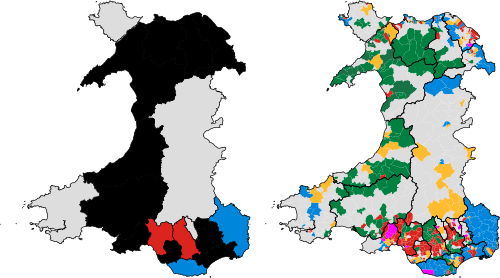1 May 2008 | |||||||||||||||||||||||||||||||||||||||||||||
All 36 metropolitan boroughs, 23 out of 50 unitary authorities, 78 out of 238 English districts, all 22 Welsh principal councils, and 1 directly elected mayor | |||||||||||||||||||||||||||||||||||||||||||||
|---|---|---|---|---|---|---|---|---|---|---|---|---|---|---|---|---|---|---|---|---|---|---|---|---|---|---|---|---|---|---|---|---|---|---|---|---|---|---|---|---|---|---|---|---|---|
| |||||||||||||||||||||||||||||||||||||||||||||
 Colours denote the winning party, as shown in the main table of results. | |||||||||||||||||||||||||||||||||||||||||||||
The 2008 United Kingdom local elections were held on 1 May 2008. These elections took place in 137 English Local Authorities and all Welsh Councils. [1]
Contents
- Results
- England
- Metropolitan boroughs
- Unitary authorities
- District councils
- Mayoral elections
- Wales
- See also
- References
There were also extraordinary elections held for four of the new unitary authorities being created, in Northumberland, County Durham and Cheshire (two councils – Cheshire East and Cheshire West and Chester). [2] Scheduled elections for Penwith in Cornwall, Shrewsbury and Atcham in Shropshire, Bedford and South Bedfordshire in Bedfordshire and five district councils in Cheshire were cancelled, due to the up-coming unitary authorities being established in those counties.
The Labour Party finished in 3rd place by vote share, trailing the Conservatives by 20%, the largest such margin ever between the two main parties. Aside from the strong showing for David Cameron's Conservatives, Plaid Cymru and the Lib Dems each made net gains of over 30 seats and the BNP made 10 net gains to finish with over 30 seats.
The strong showing for the Conservatives and the disappointing showing by Labour reflected the change in the political mood of Britain at the time, where the Labour government, now led by prime minister Gordon Brown, had suffered a slump in popularity due to the 2008 financial crisis and economic fears which were affecting Britain at the time.



